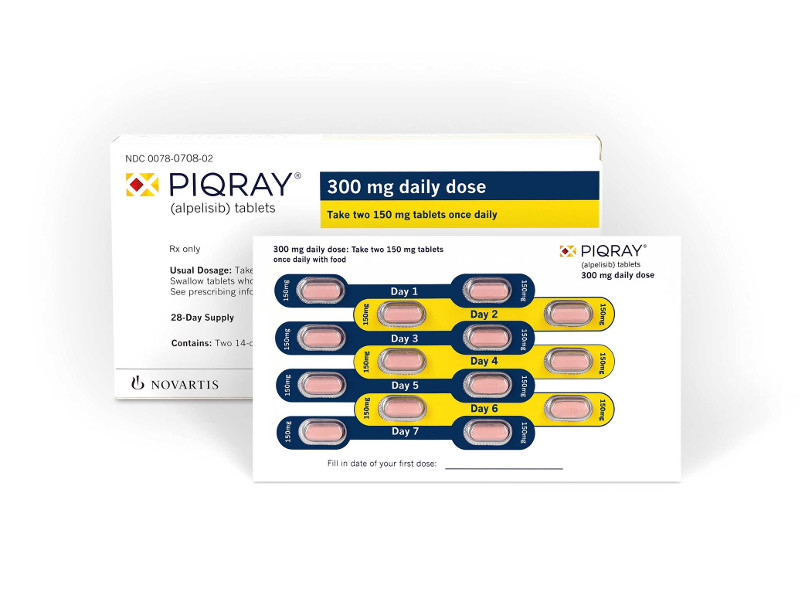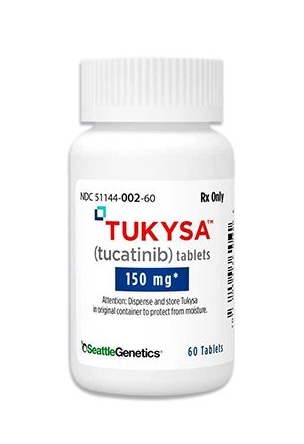Piqray (alpelisib) vs Tukysa (tucatinib)
Piqray (alpelisib) vs Tukysa (tucatinib)
Piqray (alpelisib) is a PI3K inhibitor specifically approved for the treatment of HR-positive, HER2-negative, PIK3CA-mutated, advanced or metastatic breast cancer, often used in combination with fulvestrant after progression on endocrine therapy. Tukysa (tucatinib), on the other hand, is a tyrosine kinase inhibitor targeting HER2, and is used to treat HER2-positive breast cancer in combination with trastuzumab and capecitabine after prior anti-HER2 therapies. The choice between Piqray and Tukysa would largely depend on the specific molecular characteristics of the breast cancer being treated, as Piqray is suited for PIK3CA-mutated cancers, whereas Tukysa is tailored for those with HER2-positive status.
Difference between Piqray and Tukysa
| Metric | Piqray (alpelisib) | Tukysa (tucatinib) |
|---|---|---|
| Generic name | Alpelisib | Tucatinib |
| Indications | Advanced or metastatic breast cancer | Advanced unresectable or metastatic HER2-positive breast cancer |
| Mechanism of action | PI3K inhibitor | HER2 tyrosine kinase inhibitor |
| Brand names | Piqray | Tukysa |
| Administrative route | Oral | Oral |
| Side effects | Hyperglycemia, rash, diarrhea, fatigue, nausea, etc. | Diarrhea, palmar-plantar erythrodysesthesia, nausea, fatigue, hepatotoxicity, etc. |
| Contraindications | Severe hypersensitivity to alpelisib | Severe hypersensitivity to tucatinib |
| Drug class | Phosphatidylinositol 3-kinase inhibitor | Tyrosine kinase inhibitor |
| Manufacturer | Novartis | Seagen Inc. |
Efficacy
Piqray (Alpelisib) Efficacy in Breast Cancer
Piqray, also known by its generic name alpelisib, is a medication specifically approved for the treatment of hormone receptor (HR)-positive, human epidermal growth factor receptor 2 (HER2)-negative, PIK3CA-mutated, advanced or metastatic breast cancer. It is used in combination with fulvestrant after the cancer has progressed following an endocrine-based regimen. The efficacy of Piqray was demonstrated in the SOLAR-1 clinical trial, where patients with PIK3CA mutations experienced a significant improvement in progression-free survival (PFS) compared to the placebo group. The median PFS for patients treated with Piqray plus fulvestrant was notably longer than for those who received fulvestrant alone, highlighting the drug's effectiveness in this subset of breast cancer patients.
Tukysa (Tucatinib) Efficacy in Breast Cancer
Tukysa, with the generic name tucatinib, is a tyrosine kinase inhibitor that is used in combination with trastuzumab and capecitabine for the treatment of adults with advanced unresectable or metastatic HER2-positive breast cancer, including those with brain metastases, who have received one or more prior anti-HER2-based regimens in the metastatic setting. The approval of Tukysa was supported by the results of the HER2CLIMB trial. This pivotal study showed that patients receiving the tucatinib combination had a significant improvement in PFS and overall survival (OS) compared to those who received trastuzumab and capecitabine alone. Moreover, Tukysa also demonstrated efficacy in patients with brain metastases, a group that often has limited treatment options.
Both Piqray and Tukysa have shown to be effective in their respective approved indications for breast cancer treatment. However, it is important to note that the efficacy of these drugs is contingent upon specific biomarkers or disease characteristics, such as the presence of a PIK3CA mutation for Piqray and HER2-positive status for Tukysa. Therefore, appropriate patient selection based on these criteria is essential for achieving the best therapeutic outcomes. Additionally, the safety and efficacy profiles of these drugs have been established in clinical trials, and their use should be guided by healthcare professionals according to the approved labeling and clinical guidelines.
While the efficacy of Piqray and Tukysa marks significant progress in the treatment of breast cancer, ongoing research and clinical trials continue to explore their full potential and the possibility of extending their use to other indications or in combination with other therapies. As with all medications, the benefits of Piqray and Tukysa must be weighed against their potential risks, and treatment should be personalized to the needs of each patient. As new data emerges, medical professionals stay updated on the latest evidence to ensure optimal patient care.
Regulatory Agency Approvals
Piqray
-
European Medical Agency (EMA), European Union

-
Food and Drug Administration (FDA), USA

Tukysa
-
European Medical Agency (EMA), European Union

-
Food and Drug Administration (FDA), USA

-
Health Canada

-
Therapeutic Goods Administration (TGA), Australia

-
Swissmedic (CH)

Access Piqray or Tukysa today
If Piqray or Tukysa are not approved or available in your country (e.g. due to supply issues), you can access them via Everyone.org.
How it works

Make an enquiry
Choose the medicine you want to buy, answer a couple of questions, and upload your prescription to speed things up. We’ll get back to you within 24 hours.


Make an enquiry
Choose the medicine you want to buy, answer a couple of questions, and upload your prescription to speed things up. We’ll get back to you within 24 hours.


Breeze through the paperwork
We'll guide you through the required documents for importing unapproved medicine, ensuring you have all the necessary information.


Get a personalized quote
We’ll prepare a quote for you, including medicine costs and any shipping, administrative, or import fees that may apply.


Receive your medicine
Accept the quote and we’ll handle the rest - sourcing and safely delivering your medicine.

Some text on this page has been automatically generated. Speak to your physician before you start a new treatment or medication.
Let's talk
If you have any questions, call us or send us a message through WhatsApp or email:
Contact us




